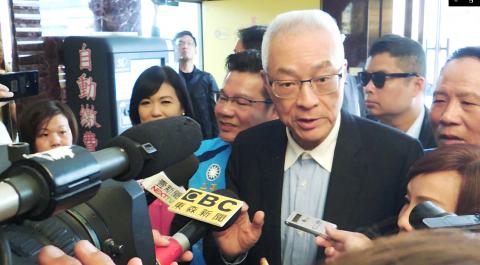Chinese Nationalist Party (KMT) Chairman Wu Den-yih’s (吳敦義) proposal to only allow KMT members to decide the party’s presidential candidate for next year continued to draw criticism yesterday, with some questioning whether he aimed to rig the game for himself.
It would be unthinkable if KMT members who are loyal to the party and have regularly paid their membership fees were excluded from the process of selecting the party’s next presidential candidate, Wu said on Thursday.
“If we choose not to conduct a poll among party members, it is a no brainer that [the public] would want to select someone who would be easily defeated,” Wu said, adding that many KMT Central Standing Committee members also believed that the rights of party members should not be undercut.

Photo: Huang Chien-hua, Taipei Times
He added that he also agreed with some people’s suggestion that the person nominated to be the next presidential candidate should also serve as KMT chairman.
There are growing calls within the KMT for the party’s next presidential candidate to be chosen solely on the results of public opinion polls, rather than the traditional method, which combines public opinion polls and party member surveys, with the results weighing 70 percent and 30 percent respectively.
The proposed “party member only” primary polls are expected to put Wu, who is rumored to be interested in running for president next year, at an advantage, as he received the support of the majority of KMT members in a six-legged 2017 party chairperson election, despite having a consistently poor public approval rating.
Former KMT chairperson Hung Hsiu-chu (洪秀柱) criticized Wu’s proposal on Friday, saying that the will of KMT members could not represent the will of the people and that a presidential primary based solely on public opinion polls would be simpler and fairer.
She also raised concerns about “dummy members,” who are recruited for the sole purpose of driving up ratings.
The practice of setting up a system for the purpose of ensuring, or impeding, one’s nomination as candidate runs counter to Republic of China founder Sun Yat-sen’s (孫逸仙) idea that “the world community is equally shared by all” (天下為公), former KMT lawmaker Sun Ta-chien (孫大千) said yesterday.
He also questioned why Wu only heard the suggestions of KMT members supporting “party member only” polls, but not the “deafening calls” for a primary based solely on the results of public opinion polls.
The question of how the primary should be conducted was being deliberated by the KMT’s think tank, Wu said, adding that its decision is expected to be announced in April.
Additional reporting by Huang Chien-hua

Alain Robert, known as the "French Spider-Man," praised Alex Honnold as exceptionally well-prepared after the US climber completed a free solo ascent of Taipei 101 yesterday. Robert said Honnold's ascent of the 508m-tall skyscraper in just more than one-and-a-half hours without using safety ropes or equipment was a remarkable achievement. "This is my life," he said in an interview conducted in French, adding that he liked the feeling of being "on the edge of danger." The 63-year-old Frenchman climbed Taipei 101 using ropes in December 2004, taking about four hours to reach the top. On a one-to-10 scale of difficulty, Robert said Taipei 101

Nipah virus infection is to be officially listed as a category 5 notifiable infectious disease in Taiwan in March, while clinical treatment guidelines are being formulated, the Centers for Disease Control (CDC) said yesterday. With Nipah infections being reported in other countries and considering its relatively high fatality rate, the centers on Jan. 16 announced that it would be listed as a notifiable infectious disease to bolster the nation’s systematic early warning system and increase public awareness, the CDC said. Bangladesh reported four fatal cases last year in separate districts, with three linked to raw date palm sap consumption, CDC Epidemic Intelligence

Two Taiwanese prosecutors were questioned by Chinese security personnel at their hotel during a trip to China’s Henan Province this month, the Mainland Affairs Council (MAC) said yesterday. The officers had personal information on the prosecutors, including “when they were assigned to their posts, their work locations and job titles,” MAC Deputy Minister and spokesman Liang Wen-chieh (梁文傑) said. On top of asking about their agencies and positions, the officers also questioned the prosecutors about the Cross-Strait Joint Crime-Fighting and Judicial Mutual Assistance Agreement, a pact that serves as the framework for Taiwan-China cooperation on combating crime and providing judicial assistance, Liang

US climber Alex Honnold left Taiwan this morning a day after completing a free-solo ascent of Taipei 101, a feat that drew cheers from onlookers and gained widespread international attention. Honnold yesterday scaled the 101-story skyscraper without a rope or safety harness. The climb — the highest urban free-solo ascent ever attempted — took just more than 90 minutes and was streamed live on Netflix. It was covered by major international news outlets including CNN, the New York Times, the Guardian and the Wall Street Journal. As Honnold prepared to leave Taiwan today, he attracted a crowd when he and his wife, Sanni,